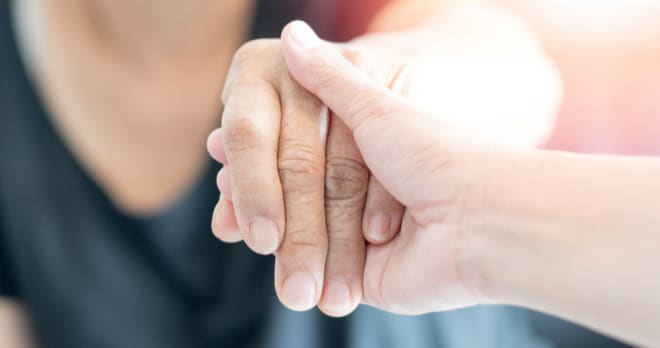What you need to know about carer’s rights this Carers Rights Day

In the current climate, it is now more vital than ever that those in unpaid caring roles know and feel empowered to exercise their rights. Data provided by Carers UK in a recent survey of nearly 6,000 carers found that 78% reported that the needs of the cared for person have increased during the coronavirus pandemic and 67% reported feeling worried about how they will cope through further lockdowns or local restrictions imposed.
Practical help and support for carers
Extra help during the coronavirus pandemic
Eligible carers responsible for looking after someone vulnerable can obtain practical help and support from NHS volunteers during the coronavirus pandemic.
For example, an NHS volunteer can assist you with tasks such as food shopping and collecting prescriptions, or other essential supplies for the cared-for person. This also reduces the risk of transmission of COVID-19 to the person you are caring for, as you don’t need to leave the house.
They can also provide you telephone support if you are feeling lonely due to self-isolation. Further information on help available from NHS volunteers is provided on the NHS website here.
Support from the local authority
Your local council may be able to provide practical help and support, and this will be determined through an assessment.
The help provided may depend on your assessed level of need and support may include arranging for the carer to have a break from their role. All carers are entitled to an initial assessment and this should be arranged by contacting the social services department of the local council.
Your rights as a carer
Rights at work
Legislation provides unpaid carers with certain rights in the workplace. Examples of these include the right to request flexible working arrangements and the right to time off in emergency situations. If you are an employee with a dependant/dependants, you are permitted a ‘reasonable’ amount of time from work to deal with an emergency. Time spent away from work to deal with emergencies can be on a paid or unpaid basis, but this will be down to the employer to decide.
Protection from discrimination
If you are a carer, you are protected from discrimination under Equality Legislation and are able to take action if you are treated unfairly due to being a carer. An example of unfair treatment may include not being considered for a promotion at work because of caring responsibilities.
What financial help is available?
If you’re in an unpaid caring role, you may be eligible to receive Carer’s Allowance; the main benefit available to carers. This can be paid, provided certain eligibility requirements are met. Namely, that you are performing the role for at least 35 hours per week and the cared for person is in receipt of a specific disability benefit. Your earnings must also be less than £128 a week after tax, National Insurance and expenses.
During the coronavirus pandemic you can still continue to claim Carer’s Allowance in the event that a temporary break from your role is required. This applies in circumstances where you or the cared for person contract coronavirus, or either party is required to self-isolate.
It is important to note that if you are ineligible to claim Carer’s Allowance on the basis that your earnings are too high you may still be eligible for Carer’s Credit. This is a National Insurance credit that contributes to your National Insurance record upon which State Pension is based. You will be eligible provided that you are looking after the cared for person for at least 20 hours per week. Further information on Carer’s Allowance and benefits can be found on the government website here.
For more information on Carer’s Rights and help and support available please visit Carers UK.